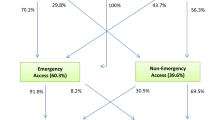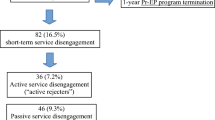Abstract
While much research has focused on the relationship between duration of untreated psychosis (DUP) and clinical outcomes in the first episode psychosis (FEP) patient population, little is known about the individual help-seeking episodes (HSE) that patients undergo before receiving appropriate care. The purpose of this project is to better understand how early referral to FEP-specific care and support system differences affect patients’ DUP and engagement with treatment. Data from 50 patients was analyzed at the Early Psychosis Intervention Clinic of New Orleans (EPIC-NOLA) using a modified version of the Pathways to Care Assessments and data captured during clinical care. Patients with their first HSE leading to a referral to EPIC-NOLA (M = 13.3, SD = 11.17) had shorter DUP compared to patients referred after two or more HSEs (M = 29.7, SD = 36. 7), t (38.6) = 2.31, p = .026, 95%CI = 2.0–30.7. One chi-square test revealed a significantly greater proportion of patients referred after one HSE stayed in treatment for 12 months or more. Cluster analysis and independent t-test analyses revealed that patients with hospital pathways (M = 35.00, SD = 39.36) had significantly longer DUP compared to those with self, other and hospital (M = 15.21, SD = 19.07) care pathways. This study supports existing literature that suggest early FEP treatment leads to shortened DUP and longer treatment engagement. Additionally, patients with support systems (people or services) assisting them with help-seeking reach EPIC-NOLA faster, have shorter DUP, and have better treatment engagement.
Similar content being viewed by others
Availability of Data and Material
Available by contacting corresponding author, at corresponding author’s discretion.
References
Johannessen JO, McGlashan TH, Larsen TK, et al. Early detection strategies for untreated first-episode psychosis. Schizophr Res. 2001;51(1):39–46.
Srihari VH, Tek C, Kucukgoncu S, et al. First-episode services for psychotic disorders in the U.S. Public sector: A pragmatic randomized controlled trial. Psychiatr Serv. 2015;66(7):705–12.
Kane JM, Robinson DG, Schooler NR, et al. Comprehensive versus usual community care for first-episode psychosis: 2-year outcomes from the NIMH RAISE early treatment program. Am J Psychiatry. 2016;173(4):362–72.
Bechard-Evans L, Schmitz N, Abadi S, et al. Determinants of help-seeking and system related components of delay in the treatment of first-episode psychosis. Schizophr Res. 2007;96(1–3):206–14.
Malowney M, Keltz S, Fischer D, Boyd JW. Availability of outpatient care from psychiatrists: A simulated-patient study in three U.S. cities. Psychiatr Serv. 66(1):94–96. https://doi.org/10.1176/appi.ps.20140051.
Addington DE, Norman R, Bond GR, et al. Development and testing of the first-episode psychosis services fidelity scale. Psychiatr Serv. 2016;67(9):1023–5.
Perkins DO, Nieri JM, Bell K, et al. Factors that contribute to the delay in the initial treatment of psychosis. Schizophr Res. 1999;36:52.
Birchwood M, Lester H, McCarthy L, et al. The UK national evaluation of the development and impact of Early Intervention Services (the National EDEN studies): Study rationale, design and baseline characteristics. Early Interv Psychiatry. 2014;8(1):59–67.
Byrne P. Managing the acute psychotic episode. BMJ. 2007;334(7595):686–92.
Fusar-Poli P, McGorry PD, Kane JM. Improving outcomes of first-episode psychosis: An overview. World Psychiatry. 2017;16(3):251–65.
Marshall M, Lewis S, Lockwood A, et al. Association between duration of untreated psychosis and outcome in cohorts of first-episode patients: A systematic review. Arch Gen Psychiatry. 2005;62(9):975–83.
Andrade LH, Alonso J, Mneimneh Z, et al. Barriers to mental health treatment: Results from the WHO World Mental Health surveys. Psychol Med. 2014;44(6):1303–17.
Gronholm PC, Thornicroft G, Laurens KR, et al. Mental health-related stigma and pathways to care for people at risk of psychotic disorders or experiencing first-episode psychosis: A systematic review. Psychol Med. 2017;47(11):1867–79.
Weiss A, Chaudhry S, Cahill JD, et al. Establishing the Early Psychosis Intervention Clinic, New Orleans (EPIC-NOLA): Sustainability challenges threaten clinical success. J Health Care Poor Underserved. Preprint posted online 4 Nov 2020.
Perkins DO, Gu H, Boteva K, et al. Relationship between duration of untreated psychosis and outcome in first-episode schizophrenia: A critical review and meta-analysis. Am J Psychiatry. 2005;162(10):1785–804.
Acknowledgements
We thank Dr. Vinod Srihari of Yale University School of Medicine for contributions in establishing the EPIC-NOLA clinic and the inspiration for the CALM community outreach program in addition to guiding this research project. We thank Dr. Patrick Bordnick of Tulane University School of Social Work for input on statistical analysis. We thank Dr. Marvin Swartz of Duke University School of Medicine for guidance on manuscript organization and data interpretation.
Author information
Authors and Affiliations
Contributions
Dr. Ashley Weiss—Substantial contributions to the conception and design of the work, revising it critically for important intellectual content, final approval of the version to be published, agreement to be accountable for all aspects of the work in ensuring that questions related. Spencer Steadman—Substantial contributions to the conception and design of the work, drafting and revising it critically for important intellectual content, final approval of the version to be published, agreement to be accountable for all aspects of the work in ensuring that questions related to the accuracy or integrity of any part of the work are appropriately investigated and resolved. Hannah Mercier, MS – Substantial contributions to the conception and design of the work, drafting and revising it critically for important intellectual content, final approval of the version to be published, agreement to be accountable for all aspects of the work in ensuring that questions related to the accuracy or integrity of any part of the work are appropriately investigated and resolved. Dr. Tonya Cross Hansel—Substantial contributions to the design of the work, analysis and interpretation of data, drafting the work or revising it critically for important intellectual content, final approval of the version to be published, agreement to be accountable for all aspects of the work in ensuring that questions related to the accuracy or integrity of any part of the work are appropriately investigated and resolved. Dr. Serena Chaudhry—Substantial contributions to the design of the work, drafting and revising it critically for important intellectual content, final approval of the version to be published, agreement to be accountable for all aspects of the work in ensuring that questions related to the accuracy or integrity of any part of the work are appropriately investigated and resolved. Dr. Isabel Clark– Substantial contributions to the conception of the work, drafting important intellectual content, final approval of the version to be published, agreement to be accountable for all aspects of the work in ensuring that questions related to the accuracy or integrity of any part of the work are appropriately investigated and resolved.
Corresponding author
Ethics declarations
Ethics Approval
The Tulane University Institutional Review Board approved all research protocols.
Consent to Participate
All patients who completed the Pathways to Care assessments received and signed research-specific informed consent paperwork.
Consent for Publication
All patients who completed the Pathways to Care assessments received and signed research-specific informed consent paperwork.
Conflicts of Interest
None.
Additional information
Publisher's Note
Springer Nature remains neutral with regard to jurisdictional claims in published maps and institutional affiliations.
Rights and permissions
Springer Nature or its licensor (e.g. a society or other partner) holds exclusive rights to this article under a publishing agreement with the author(s) or other rightsholder(s); author self-archiving of the accepted manuscript version of this article is solely governed by the terms of such publishing agreement and applicable law.
About this article
Cite this article
Weiss, A., Steadman, S., Mercier, H.D. et al. Pathways to Care: How Help-Seeking Behaviors Relate to Duration of Untreated Psychosis and Treatment Engagement. Psychiatr Q 93, 473–482 (2022). https://doi.org/10.1007/s11126-021-09960-5
Accepted:
Published:
Issue Date:
DOI: https://doi.org/10.1007/s11126-021-09960-5




